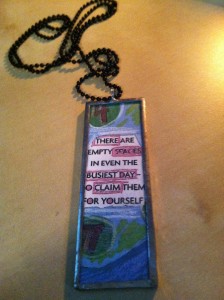When brilliant writer/director/actor Harold Ramis died in 2014, in one of the many appreciations of the man and his work, I came across a gem from Mike Sacks’s interview with him in And Here’s the Kicker: Conversations with 21 Top Humor Writers on Their Craft. Ramis said, discussing his job in 1966:
“I worked in a mental institution in St. Louis, which prepared me well for when I went out to Hollywood to work with actors. People laugh when I say that, but it was actually very good training. And not just with actors; it was good training for just living in the world. It’s knowing how to deal with people who might be reacting in a way that’s connected to anxiety or grief or fear or rage. As a director, you’re dealing with that constantly with actors. But if I were a businessman, I’d probably be applying those same principles to that line of work.”
The world looks different when viewed through that kind of lens—acknowledging the twisty roots of human behavior. It’s easier to connect with compassion, rather than judgment, when you can glimpse the anxiety, grief, fear, or rage that might be just below the surface of someone’s actions. And this works with your own behavior as well as other people’s, because self-compassion is essential.
So often, we project our own story onto behavior we witness. They are doing X because Y. I am doing this because that. When the real story comes to light (if it ever does), we are surprised to learn that what was going on was not at all what we thought was happening. Sometimes our story is a long way from reality.
We have traveled to Texas five times since March to care for Fred’s mom, Sarah. When we were coming home from a trip in May, the aftermath of terrible storms was causing intermittent power failures at Love Field airport. Everyone in the check-in hall groaned every time the lights blinked off, meaning the computers all had to very, very slowly reboot. It took us an hour and a half to check our bags, though we were still on time for our delayed flight. When we arrived at our gate to board, however, we were told the plane had left early without us. Ruby immediately burst into sobs. She had been—and continues to be—a trouper through the countless upheavals and missed activities of this spring and summer. At that moment, though, the dam burst and all her grief poured out. She just really wanted to go home, to be in her own room.
An observer might have thought she was overreacting or was just a spoiled child having a tantrum. Her parents knew that she had finally reached a breaking point after months of anxiety, grief, fear, and rage as her beloved grandma copes with a terminal diagnosis. I was frayed from Ruby’s growing impatience during the long bag-check process and rather sharply sent her away, and then rather sharply sent Fred to sit with her so that I could negotiate a new path home with the gate agent. That sweet agent saw us with compassion and swooped in to put us on the earliest possible flight on standby, plus another standby and a definite late-night flight back to DC.
After we had a way home, I joined Fred and Ruby and apologized. We hugged and talked and discovered that beyond just desperately wanting to go home, Ruby was deeply worried that her beloved stuffed animals, packed in her checked suitcase, would not make it home when we did. I realized that our seasoned traveler has rarely had to deal with travel troubles, so she had no frame of reference for what would happen to her bag in this situation. We reassured her about where bags go if they take a trip without you and agreed to buy her a stuffed animal before we left the airport, just in case. Shelly the Texas armadillo has been a nice addition to the family. And Ruby got to sit in the cockpit when we stopped in St. Louis, something she would have missed on our nonstop flight.
As you go through your day, think of the compassionate wisdom offered by Harold Ramis. Think of Ruby, catastrophizing in the airport. Don’t assume you know the drivers of anyone’s behavior, including your own. Ask more questions. Listen to the answers. Be more loving. Respond with compassion.
[All words and images copyright Paula J. Kelly, unless otherwise credited.]





